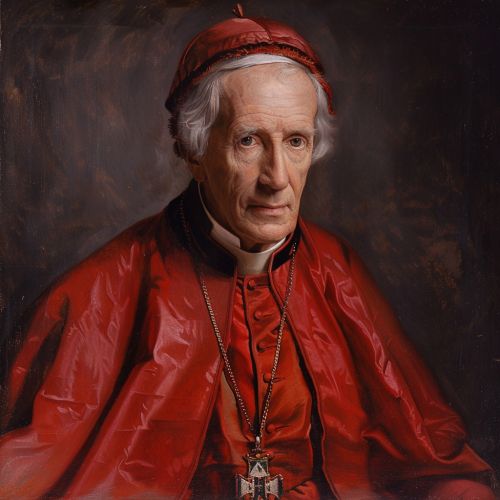John Henry Newman
Early Life and Education
John Henry Newman was born on February 21, 1801, in London, England. He was the eldest of six children in a family with a modest income. His father, John Newman, was a banker, and his mother, Jemima Fourdrinier, came from a family of Huguenot descent. Newman's early education took place at Ealing School, where he demonstrated a keen intellect and a passion for learning.
In 1816, Newman experienced a profound religious conversion, which he later described as the most significant event of his life. This conversion led him to pursue a career in the Anglican Church. In 1817, he entered Trinity College, Oxford, where he excelled academically. He graduated with a first-class degree in 1821 and was elected a fellow of Oriel College in 1822.
Anglican Ministry
Newman was ordained as an Anglican deacon in 1824 and as a priest in 1825. He served as a curate at St. Clement's Church, Oxford, and later as vicar of St. Mary's Church, the university church of Oxford. During his time at St. Mary's, Newman became known for his eloquent sermons, which attracted large congregations and had a significant impact on the religious life of the university.
In the 1830s, Newman became a leading figure in the Oxford Movement, a group of Anglican clergy and laypeople who sought to revive the Catholic heritage of the Church of England. The movement emphasized the importance of the apostolic succession, the sacraments, and the authority of the church. Newman's involvement in the Oxford Movement led to the publication of the influential series of pamphlets known as the "Tracts for the Times," which he edited and contributed to.
Conversion to Catholicism
Newman's theological journey led him to question the validity of the Anglican Church's claims to apostolic succession and catholicity. His studies of the early church fathers and the development of Christian doctrine convinced him that the Roman Catholic Church was the true continuation of the church founded by Christ. In 1845, after much inner turmoil and reflection, Newman was received into the Roman Catholic Church by Dominic Barberi, an Italian Passionist priest.
Newman's conversion was a momentous event that caused a sensation in England. He was subsequently ordained as a Catholic priest in 1847 and joined the Oratory of Saint Philip Neri, an order of priests dedicated to pastoral work and education. Newman founded the first English Oratory in Birmingham in 1848, where he spent much of his later life.
Literary Contributions
John Henry Newman was a prolific writer whose works spanned theology, philosophy, history, and literature. His "Essay on the Development of Christian Doctrine" (1845) is considered a seminal work in the field of doctrinal development. In this essay, Newman argued that Christian doctrine evolves over time through a process of organic development, guided by the Holy Spirit.
Another significant work is "The Idea of a University" (1852), in which Newman articulated his vision for higher education. He argued that a university should be a place of intellectual inquiry and the pursuit of truth, where students are educated not only in specialized knowledge but also in the broader context of the liberal arts. This work has had a lasting influence on the philosophy of education.
Newman's "Apologia Pro Vita Sua" (1864) is an autobiographical defense of his religious beliefs and his conversion to Catholicism. Written in response to criticisms from Charles Kingsley, an Anglican clergyman, the "Apologia" is a detailed account of Newman's spiritual journey and theological development. It remains one of the most important works of religious autobiography in the English language.
Cardinalate and Later Life
In recognition of his contributions to theology and the Catholic Church, Newman was elevated to the rank of cardinal by Pope Leo XIII in 1879. As a cardinal, Newman continued to write and engage in theological debates, although he did not participate in the political and administrative affairs of the church.
Newman spent his later years at the Birmingham Oratory, where he focused on pastoral work, writing, and correspondence. He maintained a deep interest in the intellectual and spiritual life of the church and continued to influence Catholic thought through his writings and personal example.
John Henry Newman died on August 11, 1890, at the age of 89. He was buried at the Oratory House in Rednal, near Birmingham. In 2010, he was beatified by Pope Benedict XVI, and in 2019, he was canonized by Pope Francis, becoming the first English saint of the modern era.


Legacy
John Henry Newman's legacy is multifaceted, encompassing his contributions to theology, education, and the spiritual life of the church. His writings continue to be studied and admired for their intellectual rigor, spiritual depth, and literary quality. Newman's emphasis on the development of doctrine has had a profound impact on Catholic theology, and his vision of a university remains influential in the field of education.
Newman's canonization has further solidified his status as a significant figure in the history of the Catholic Church. His life and work continue to inspire scholars, theologians, and believers around the world.
See Also
- Oxford Movement
- Apostolic Succession
- Congregation of the Oratory
- Doctrinal Development
- Pope Leo XIII
